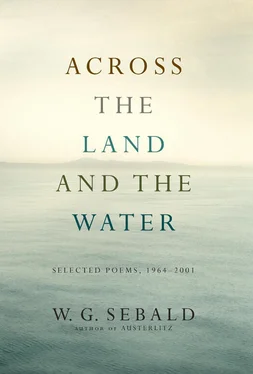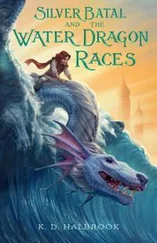9 Life Is BeautifulPT, FSZ 15 (1965), H.
10 Matins for G. PT, FSZ 15 (1965), H. Where no kitchen/There no cook: As Leon, in Act 1 of Franz Grillparzer’s drama Weh dem, der lügt! ( Woe to Him Who Lies! ), Vienna: 1840 (p. 6), exclaims, “Wo keine Küche, ist kein Koch.”
11 Winter PoemPT, FSZ 15 (1965), H. Child Jesus in Flanders: the German translation of the Flemish writer Felix Timmermans’s novel ( Het Kindeken Jezus in Vlaanderen, 1917), published in 1919 under the title Das Jesuskind in Flandern , was immensely popular in Germany between the wars and during the 1950s. Its plot sets the birth of Christ in rural Flanders. Another story, “Jésus-Christ en Flandre” (1831) by Honoré de Balzac, is apparently based on a medieval folktale. The Christ-child theme recalls the nativity scenes of Dutch Masters. Believe and be saved: see Mark 16: 16. A handwritten comment on the PT typescript claims there is too great a discrepancy in the poem between the ironic tone of the second stanza and the apparent naïveté of the first.
12 Lines for an AlbumPT, FSZ 15 (1965), H.
13 Bleston: A Mancunian CanticalPT, H. Title: in English in the original text. Bleston is the name given to Manchester in the 1957 novel L’Emploi du temps (translated into English as Passing Time ) by the French writer Michel Butor (b. 1926). Like Sebald (1966–68), Butor had been an assistant teacher at Manchester University (1951–53). The final section (“Max Ferber”) of W. G. Sebald’s prose work The Emigrants is set in Manchester, as is the fourth part of “Dark Night Sallies Forth,” the final section of After Nature . Sebald finished writing the poem on or shortly before January 26, 1967 (according to a letter that he wrote to his friend Albrecht Rasche). The poem presents a labyrinth of allusions, and the reader who attempts to follow them risks becoming “Perdu dans ces filaments” (lost in these filaments), a fate of which the title of the fifth part of the poem appears to warn us. Fête nocturne: night party. Big Warehouse: in English in the German text. Lewis’s was a former Manchester department store, opened in 1877. “Warehouse” is probably a Germanicism, an Englishing of the German “Warenhaus” (department store). Consensus Omnium: agreement of all. Place of Breast-like hills: in English in the German text. Dis … curavi: “Dis Manibus” is found on Roman gravestones and means “for the spirits of the ancestors”; in this case, “for the spirits of the ancestors I have arranged for the building of this Mamucium [Manchester].” à travers les âges: through the ages. Sharon’s Full Gospel … before our eyes: in English in the German text. According to the website of the Sharon Full Gospel Church, the church “began with a gospel mission in a tent in Pontypool Park during 1936. Many local people were … miraculously healed.” There is an SFG church in South Manchester. Lingua Mortua: dead language. Kebad Kenya: a character in an episode in the first volume (Das Holzschiff ) of Hans Henny Jahnn’s novel Fluß ohne Ufer (1949). The story has appeared in English in a translation by Gerda Jordan-Peterson in The Ship (1961) and Thirteen Uncanny Stories (1984). Briefly, Kebad decides to eat himself, fails to die, attempts to become one with his mare, lies down as if dead, is buried, witnesses the corruption of the flesh, is a revenant, takes possession of men’s bodies, and inflicts terror by stealing horses. Hipasos ( sic ) of Metapontum: Pythagorean philosopher who conducted experiments in musical theory. Hippasos claimed the discovery of concords with bronze disks of equal diameter and varying thickness. Et pulsae referunt ad sidera valles: and the valleys echoed the sounds to the stars (Virgil’s Eclogue 6.1.84). fil d’Ariane: Ariadne’s thread. The theme of Ariadne and Theseus, the labyrinth and the Minotaur, are ever present in Butor’s novel L’Emploi du temps: “that rope of words is like Ariadne’s thread (ce cordon des phrases est un fil d’Ariane ), because I am in a labyrinth, because I am writing in order to find my way about in it … the labyrinth of my days in Bleston, incomparably more bewildering than that of the Cretan palace, since it grows and alters even while I explore it” ( Passing Time , trans. Jean Stewart, New York: 1969, p. 195). opgekilte schottns: both words occur in the Yiddish lexicon, the second one more frequently as shotns . If Sebald intended the words to be recognized as Yiddish, they would mean something like “frozen shadows.” Perhaps they should be read in the context of “return,” albeit a return antithetical to the desired echo: the revenant murderous shadows of Kebad, or Theseus, who after abandoning Ariadne on Naxos forgot to change the black sail to white, thereby causing the death of his father, Aegeus. Alma quies optata veni nam sic sine vita / Vivere quam suave est sic sine morte mori: “How sweet, though lifeless, yet with life to lie, / And, without dying, O how sweet to die” (translation by John Walcott [1738–1813]). Authorship of the epigram appears to be obscure, with Georg Christoph Lichtenberg attributing the lines to Heinrich Meibom (1555–1625), while British critics have tended to see the poet laureate Thomas Wharton (1728–90) as the author. Rapunzel: In the fairy tale collected by the Brothers Grimm, Rapunzel, exiled to the wilderness by the witch to live on her own, one day hears the voice of the prince, whom the witch has blinded by throwing him from the tower. They reunite, his sight is restored, and they live happily ever after. Perdu dans ces filaments: lost in these filaments. A quotation from Michel Butor’s novel L’Emploi du temps (Paris: 1956, p. 54) ( Passing Time , op. cit., p. 41): “Thus I, a mere virus lost amidst its filaments, was able like a scientist armed with his microscope to study this huge cancerous growth.” Eli Eli (Mark 15: 34): “Eloi, Eloi, lama sabachthani?” (“My God, my God, why hast thou forsaken me?”) Mr. Dewey’s International classification system: Melville Louis Kossuth Dewey (1851–1931) invented the Decimal Classification System, which revolutionized library cataloging in the 1870s and 1880s. On ne doit plus dormir: One must no longer sleep. The French dictum derives from Theodor W. Adorno’s essay “Commitment” (see New Left Review , First Series, no. 87–88, 1974, p. 85), first published in German in 1962: “The abundance of real suffering tolerates no forgetting; Pascal’s theological saying, On ne doit plus dormir , must be secularized.” Adorno, however, has adapted rather than cited Pascal, who wrote: “Jésus sera en agonie jusqu’à la fin du monde. Il ne faut pas dormir pendant ce temps-là” (“The agony of Jesus will last until the world ends. Until that time we must not sleep”), in Blaise Pascal, Pensées (919) (Texte établi par Louis Lafuma), Paris: 1963 (p. 378).
14 DidsburyPT, H. Title: the author lived in Didsbury, a suburb of Manchester, from January 1967 until his departure in 1968 to teach at a school in St. Gallen, Switzerland, initially sharing a flat with Reinbert Tabbert. The poem was among a small number of items, including “Giulietta’s Birthday” and “Time Signal at Twelve,” collected in a Festschrift put together in the summer of 1967 by Tabbert and Sebald for Idris Parry (1916–2008), a professor of German at the University of Manchester and Sebald’s later supervisor for his M.A. dissertation (1968) on the German writer Carl Sternheim. An earlier version of the poem is entitled “Weekend.”
Читать дальше












